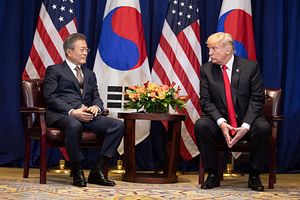During the recent announcement of the deal to create the U.S.-Mexico-Canada Agreement (USMCA), U.S. President Donald Trump could not resist the urge to once again criticize the Korea-U.S. Free Trade Agreement (KORUS FTA). Not only did Trump restate his belief that KORUS was a “horrible” deal, he alleged that unnamed forces proceeded with signing the original deal knowing it would lead to 250,000 U.S. jobs being “given” to South Korea.
Trump is known for imprecise language, but this accusation is particularly vexing because his statement implies harmful motives on the part of past policymakers for knowingly pushing for trade agreements designed to harm American workers. One could poke fun at the supposed job loss inflation Trump has cited over the past two years – in 2016, he said KORUS cost the U.S. 100,000 jobs; in 2017, it magically doubled to 200,000 jobs; and now it jumped to 250,000 jobs. However, no one – not even the detractors of the KORUS FTA at the time – predicted that 250,000 U.S. jobs would be “given” to Korea as a result of the agreement.
No U.S. government agency predicted any job loss from KORUS. The independent U.S. International Trade Commission (USITC) concluded in its study on KORUS that “aggregate U.S. output and employment changes would likely be negligible.” Nonetheless, the USITC estimated that once KORUS was fully implemented, U.S. merchandise exports to Korea would likely increase by $9.7-$10.9 billion. Because the U.S. Department of Commerce regularly updates its calculation of jobs per exports ratio, the Obama administration estimated that if U.S. merchandise exports grew by $11 billion, then the number of U.S. jobs supported by these additional exports would be 70,000.
However, opponents of KORUS took the jobs to export ratio and misapplied it to the U.S. trade deficit. To them, any trade deficit results in U.S. job losses even though imports create hundreds of thousands of jobs in the United States. During the debate over KORUS, the Economic Policy Institute (EPI) claimed that KORUS would “displace about 159,000 American jobs with the first seven years after it takes effect” because the author of their study believed the bilateral trade deficit with Korea would increase to $16.7 billion. However, nowhere in the EPI analysis contained a forecast that KORUS would give 250,000 U.S. jobs to Korea.
Now that we are six and half years into the implementation of KORUS, we can see that the EPI projections were incorrect on several levels. First, the USITC issued a follow-up report in 2016 discussing the economic impact of all free trade agreements. It concluded that the KORUS FTA improved the bilateral trade deficit between the United States and South Korea by $15.8 billion. Recent U.S. government trade data shows a continuing decline in the bilateral goods and services trade deficit, reaching only $1 billion for the first six months of 2018, a decline of 73 percent from a year ago.
The United States is on track this year to have a trade deficit that is more than half of what it was in 2011, the year prior to the implementation of KORUS, all before any new revisions to the agreement that were negotiated by the Trump administration take effect. Thus, using the logic of EPI, not only have there been no U.S. job losses as a result of KORUS, but there has been massive job creation in the past few years as the trade deficit has dramatically declined.
Second, the Commerce Department issued a study that estimated the number of U.S. jobs related to exports by key destinations, including Korea. From 2009 until 2015, Commerce concluded that 87,000 new U.S. jobs were supported by exports to Korea. In addition, the Commerce Department also estimated that 25,000 new U.S. jobs were created as a result of increased foreign direct investment (FDI) from Korea. These jobs provide an annual compensation package that averages $91,100. Thus, all totaled, the Commerce Department estimates that trade with Korea is directly responsible for approximately 410,000 U.S. jobs, an increase of 38 percent since 2009.
Thus, instead of a 250,000 job loss, trade with Korea has created over 110,000 new jobs in the United States in less than a decade, exceeding the Obama administration’s prediction. The KORUS FTA has worked quite well for America, both in terms of increasing U.S. exports, decreasing the bilateral trade imbalance, and creating good paying jobs right here in America.
Phil Eskeland served over 27 years in the U.S. government, mostly as a senior Congressional staff person, specializing in the areas of international economics, foreign affairs, small business, and budget. He is currently the Executive Director of Operations and Policy at the Korea Economic Institute of America. KEI is registered under the Foreign Agents Registration Act as an agent of the Korea Institute for International Economic Policy, a public corporation established by the Government of the Republic of Korea.

































